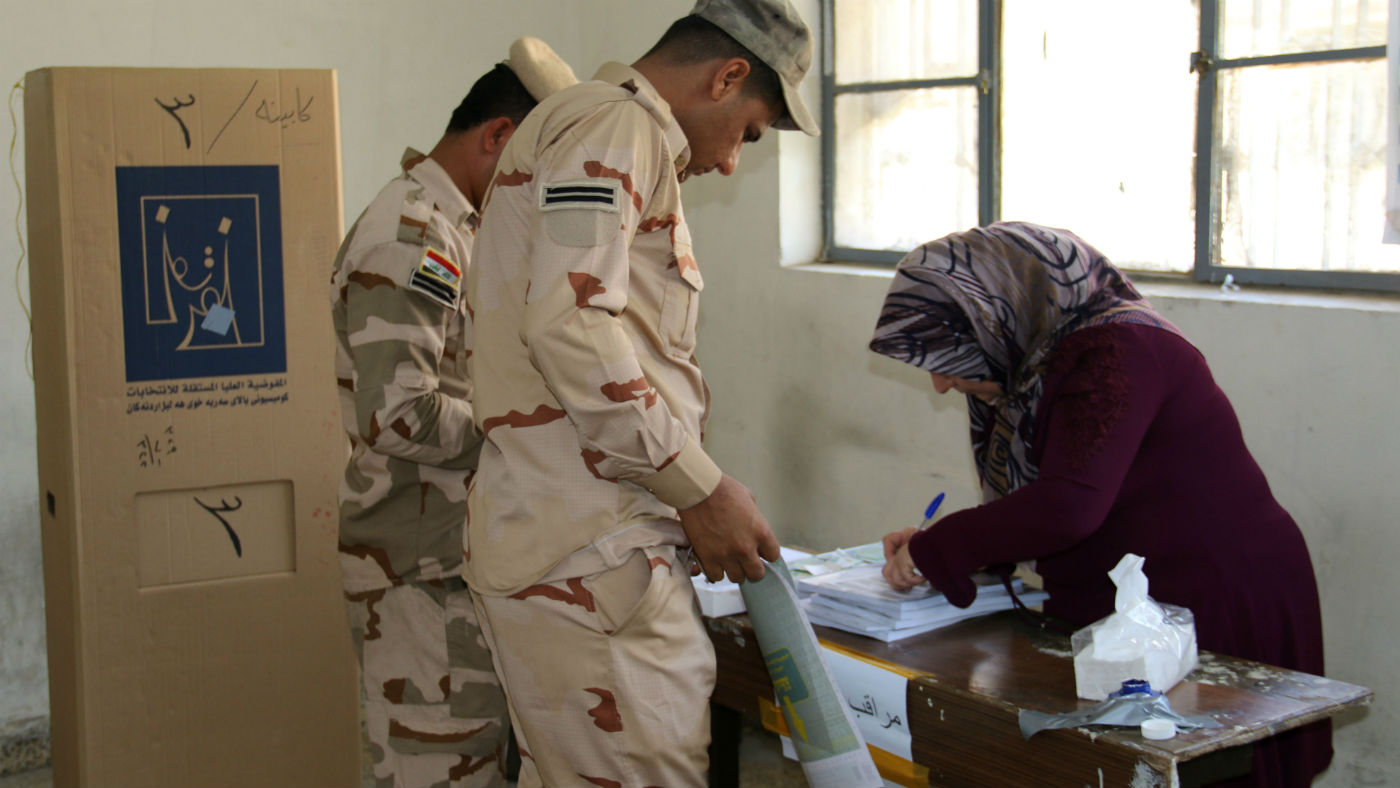Iraq parliamentary elections: what’s at stake?
Voters go to the polls tomorrow for the first time since the defeat of Islamic State

A free daily email with the biggest news stories of the day – and the best features from TheWeek.com
You are now subscribed
Your newsletter sign-up was successful
On 12 May, Iraqi voters will head to the polls for the country’s fourth parliamentary elections since the fall of Saddam Hussein in 2003, and the first since the defeat of Islamic State last year.
The 329 members elected to the Council of Representatives this weekend will choose the country’s next prime minister and president, as well as setting the legislative tone of the next four years.
Who are the main parties?
The Week
Escape your echo chamber. Get the facts behind the news, plus analysis from multiple perspectives.

Sign up for The Week's Free Newsletters
From our morning news briefing to a weekly Good News Newsletter, get the best of The Week delivered directly to your inbox.
From our morning news briefing to a weekly Good News Newsletter, get the best of The Week delivered directly to your inbox.
Iraq’s political scene is “splintered by intra-sectarian divisions and fragmented Shia, Sunni and Kurdish factions”, says Al Jazeera, and that is reflected in the number of parties in the running: 87, grouped into various electoral alliances.
Current prime minister and tentative frontrunner Haider Al-Abadi is hoping for re-election at the head of the Nasr (Victory) coalition, “capitalising on his government's victory over IS in 2017”.
Meanwhile, former prime minister Nouri al-Maliki’s is gunning for a comeback as leader of the Dawlat al-Qanoon (State of Law) Coalition.
Other groups expected to make a significant showing include the Fatah (Conquest) alliance, led by a Shiite militia leader with close ties to Iran, and Al-Sairoon, a cross-sectarian coalition running on an anti-corruption platform.
A free daily email with the biggest news stories of the day – and the best features from TheWeek.com
What issues are on the table?
A nationwide poll taken in March on behalf of news website 1001 Iraqi Thoughts, suggested that, like voters all over the world, Iraqis are most concerned about employment and the economy.
However, security also looms large. At least 382 people have died in terror attacks since the start of 2018, including 38 in an IS suicide bomb attack at a market in Baghdad in January.
The precarious security situation is reflected in the election itself. “Iraqi media has reported more than 15 assassination attempts against candidates or election officials over the past month,” The Atlantic reports.
In an attempt to keep movement to a minimum, airports, ports and border crossings will be closed for 24 hours from midnight on Friday, and polling stations will be heavily guarded by the army.
Despite threats of violence, 83% of those polled in an April survey said they intended to vote.
Who will win?
The fragmented nature of Iraq’s political landscape means a relatively small vote share for Al-Abadi’s Victory coalition would be enough to win him a comfortable second term.
However, a coalition needs at least 50% of the vote to independently elect a new prime minister and president, so expect even more alliances after the results are announced.
One thing is certain: the winners will not have time to rest on their laurels. Whichever faction ends up in power “will face the challenge of rebuilding Iraq after four years of war with Islamic State, jump-starting a flagging economy, balancing the interests of powerful foreign patrons and maintaining the country’s fragile unity”, says Reuters.
-
 The broken water companies failing England and Wales
The broken water companies failing England and WalesExplainer With rising bills, deteriorating river health and a lack of investment, regulators face an uphill battle to stabilise the industry
-
 A thrilling foodie city in northern Japan
A thrilling foodie city in northern JapanThe Week Recommends The food scene here is ‘unspoilt’ and ‘fun’
-
 Are AI bots conspiring against us?
Are AI bots conspiring against us?Talking Point Moltbook, the AI social network where humans are banned, may be the tip of the iceberg
-
 Epstein files topple law CEO, roil UK government
Epstein files topple law CEO, roil UK governmentSpeed Read Peter Mandelson, Britain’s former ambassador to the US, is caught up in the scandal
-
 Iran and US prepare to meet after skirmishes
Iran and US prepare to meet after skirmishesSpeed Read The incident comes amid heightened tensions in the Middle East
-
 Israel retrieves final hostage’s body from Gaza
Israel retrieves final hostage’s body from GazaSpeed Read The 24-year-old police officer was killed during the initial Hamas attack
-
 China’s Xi targets top general in growing purge
China’s Xi targets top general in growing purgeSpeed Read Zhang Youxia is being investigated over ‘grave violations’ of the law
-
 Panama and Canada are negotiating over a crucial copper mine
Panama and Canada are negotiating over a crucial copper mineIn the Spotlight Panama is set to make a final decision on the mine this summer
-
 Why Greenland’s natural resources are nearly impossible to mine
Why Greenland’s natural resources are nearly impossible to mineThe Explainer The country’s natural landscape makes the task extremely difficult
-
 Iran cuts internet as protests escalate
Iran cuts internet as protests escalateSpeed Reada Government buildings across the country have been set on fire
-
 US nabs ‘shadow’ tanker claimed by Russia
US nabs ‘shadow’ tanker claimed by RussiaSpeed Read The ship was one of two vessels seized by the US military